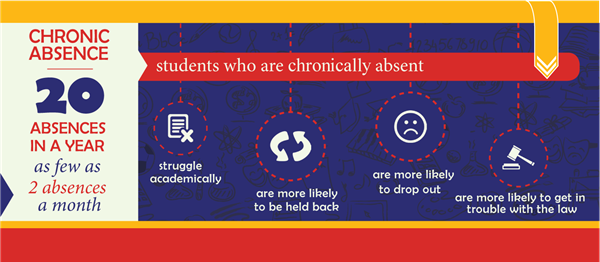Attendance Legal Requirements-Excused and Unexcused

Good attendance is important for many reasons. Your child receives the maximum benefit of education by being in school every day, and numerous studies show a strong link between academic performance and consistent attendance. Because attendance is so critical for the quality of your child's education, the State of Texas has a Compulsory Attendance Law. Texas law requires school children to attend school each day that instruction is provided. The law applies to children between the ages of 6 and 19. If you voluntarily enroll your child in prekindergarten or kindergarten before age 6, school attendance laws apply to your child, too.
Excused Absences
Although perfect attendance is the goal, it's not always possible. School districts are required to excuse a student's absence to:
Observe a religious holy day
To be considered a religious holy day, the day should be one generally recognized by the student’s religious denomination as a holy day that is required to be observed by all members of that denomination.
Church retreats, camps, and mission trips and individual religious rites (baptisms, christenings, bar mitzvahs, etc.) are not considered holy days.
Attend a required court appearance
Student’s name must appear on the court summons.
Serve as an election clerk
Appear at a governmental office to complete paperwork required in connection with the student's application for U.S. citizenship
Take part in a U.S. naturalization oath ceremony
Sound "Taps" at a military honors funeral held in Texas for a deceased veteran
Attend a healthcare appointment
The student must return to school on the same day of appointment.
Visit college campuses
Juniors and seniors
Generally, an absence may qualify as excused in cases of:
Funeral - must be an immediate family member
Doctor appointment
School-sponsored curricular or extracurricular activities
Unexcused Absences
What is not an acceptable excuse for being absent from school:
Student stays home to take care of sibling or parent
More than 5 parent contacts without a doctor's note are unexcused
Non-enrollment days
Days the student is not in school due to changing schools
Student travels out of town to visit relatives or vacationing with family
Penalties for too many unexcused absences:
Parents are held responsible for unexcused absences. Yes, even if your child is 16 years old and skips class without you knowing, you are considered responsible.
A compulsory attendance notification will be sent to the parent if a student has unexcused absences on 10 or more days or parts of days within a six-month period or three days or parts of days without an excuse during a four-week period. Notice it says "parts of days". That means that leaving school early, or arriving after the first bell has rung, even if the child attended for some of the day, can count as an absence.
The attendance warning letter gives the parent notice that the student has accumulated too many unexcused absences (and should not have any future absences) and gives the parent a chance to make corrections to the child's attendance record.
If corrections are not made, a court warning will notify the parent of the potential to be filed on in a justice or municipal court (or refer the student to juvenile court). Parents may be criminally charged, or fined, if their child has another unexcused absence.
90 Percent Rule:
In addition to the Compulsory Attendance Law, there is the "90 Percent Rule," which states that students must attend class for 90 percent of the time it is offered to receive credit for the class.
View the Texas Education Agency Correspondence regarding the 90 Percent Rule.
